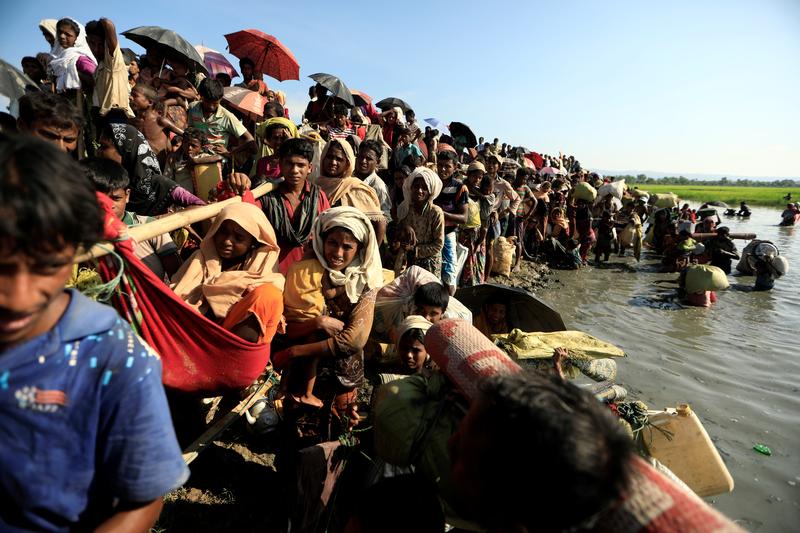It’s difficult to read the accounts of alleged human rights violations by the Burmese military against Rohingya Muslims of Arakan State, but those who fled to Bangladesh are describing what has happened because they want help. They want the world to act.
It is now seven weeks since this crisis began and the European Union has done absolutely nothing to pressure Burma Army head Senior-General Min Aung Hlaing and his military to stop its campaign of what the United Nations has described as a “textbook example of ethnic cleansing” against the Rohingya. When European Union foreign ministers meet today, this must change.
Since 25 August, when Min Aung Hlaing used attacks on police posts by Rohingya insurgents as a pretext for launching its counter-insurgency campaign, Burma has been experiencing its worst human rights crisis in decades. More than 500,000 Rohingya have fled to neighbouring Bangladesh, and human rights organisations estimate hundreds more have been killed.
This exceptional situation requires an exceptional response, but to date the response of the European Union has been nothing more than a couple of weak statements by the EU External Action Service that didn’t even use the word Rohingya for fear of offending the government of Burma.
There is no single measure that can be taken to force Min Aung Hlaing to end his campaign of ethnic cleansing, but there are many actions that can be taken, which will start to apply effective pressure. All that is needed is political will.
Such measures should include support for a UN-mandated global arms embargo; visa bans on military personnel; expanding the existing EU arms embargo to ban European companies from supplying any kind of equipment to the military; banning new investment in — and business relationships with — military-owned companies and members of the military and their families; and all European countries ending any form of training or cooperation otherwise with the Burmese military.
This form of sanctions targets the military and their interests rather than the general population of the country. These sanctions will not just have short- and long-term impacts on the military in terms of finance and equipment. Equally powerful is the political message that they send to Min Aung Hlaing, for whom international acceptance and cooperation is clearly very important.
It is important to avoid the kind of mistakes made in the previous implementation of sanctions on Burma by the EU. Token measures in order to be seen to be doing something, in lieu of genuinely practical sanctions, should be avoided. For example, an asset freeze applied against certain individuals and entities, with the full knowledge that few if any assets exist in the EU to be frozen, should be avoided.
Nor will a decade’s-long, slow and incremental increase in sanctions be effective. Sanctions must not simply be applied as a slap on the wrist after an atrocity. They must go hand-in-hand with a comprehensive diplomatic strategy to pressure the military to agree to change. This must incorporate all economic, legal and diplomatic options.
The European Union must also make it clear to State Counsellor Aung San Suu Kyi and the government of Burma that future cooperation and support is conditional on an end to the policy of lying about the situation and denying human rights violations are taking place; ending policies oppressing the Rohingya; and lifting all restrictions on humanitarian aid to everyone in Arakan State and the rest of the country.
The international community, including the European Union, has failed the Rohingya. Hundreds of thousands of the Muslim minority, many of them children, have paid the price. For too many, that price has been their life. On 16 October this must start to change. The European Union must use every tool at its disposal to try to pressure Min Aung Hlaing to halt this campaign of ethnic cleansing. Everything that can be done must be done.
[related]
Too often after past atrocities the world has said “never again,” only to allow atrocities to happen again. The European Union has failed to act effectively to prevent this current atrocity. Even as repression of the Rohingya increased since 2012, the EU lifted sanctions and embraced the military, giving Min Aung Hlaing red carpet tours of European capitals. It is not too late to act to try to prevent further atrocities. Lives depend on it.
Failure to act will send a clear message to Min Aung Hlaing that as far as the EU is concerned, when it comes to ethnic cleansing, Europe’s response is, “Yes on our watch.”
Mark Farmaner is director of Burma Campaign UK. The views expressed here are his own.



